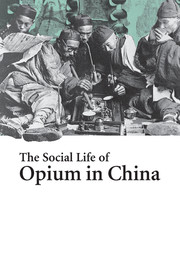Book contents
- Frontmatter
- Contents
- List of illustrations
- List of maps
- List of tables
- Acknowledgements
- Introduction
- 1 ‘The art of alchemists, sex and court ladies’
- 2 As the empire changed hands
- 3 ‘The age of calicoes and tea and opium’
- 4 ‘A hobby among the high and the low in officialdom’
- 5 Taste-making and trendsetting
- 6 The political redefinition of opium consumption
- 7 Outward and downward ‘liquidation’
- 8 ‘The volume of smoke and powder’
- 9 ‘The unofficial history of the poppy’
- 10 Opiate of the people
- 11 The road to St Louis
- 12 ‘Shanghai vice’
- Conclusion
- Notes
- Glossary
- Bibliography
- Index
9 - ‘The unofficial history of the poppy’
Published online by Cambridge University Press: 05 June 2012
- Frontmatter
- Contents
- List of illustrations
- List of maps
- List of tables
- Acknowledgements
- Introduction
- 1 ‘The art of alchemists, sex and court ladies’
- 2 As the empire changed hands
- 3 ‘The age of calicoes and tea and opium’
- 4 ‘A hobby among the high and the low in officialdom’
- 5 Taste-making and trendsetting
- 6 The political redefinition of opium consumption
- 7 Outward and downward ‘liquidation’
- 8 ‘The volume of smoke and powder’
- 9 ‘The unofficial history of the poppy’
- 10 Opiate of the people
- 11 The road to St Louis
- 12 ‘Shanghai vice’
- Conclusion
- Notes
- Glossary
- Bibliography
- Index
Summary
Opium improved sex. It also generated literature, both classical and vernacular. This chapter explores the different kinds of literature that opium inspired. ‘Language is of critical importance in cultural transmission’, Evelyn Rawski writes. Opium-generated literature will allow us to see this importance. Opium helped to electrify a leisure revolution; it was also involved in a cultural revolution, namely the modernisation of the Chinese language in the late nineteenth and early twentieth centuries. The late Qing was an outstanding period. At this time the Chinese language was simplified and vernacular literature flourished. Newspapers, magazines, popular fiction and local dialect drama became available, as governments, institutions and individuals embarked on a crusade to enlighten the poor. Scholars have made comprehensive studies of the literature of the late Qing, including Keith McMahon, whose recent book looks specifically at opium smoking in late Qing fiction. Whilst the enlightenment undoubtedly enlightened the poor, it also helped to further spread the gospel of opium. Men of letters found a new fountain of inspiration. Opium fared well in their hands, not only because it accompanied them in their lettered pursuits but also because it reinvented their talents and identities. Some sang praises to opium, some denounced it, some were anti-British, others were popular entertainers. The literature generated by opium can be placed in various different categories.
PRAISE AND CONDEMNATION
Early opium literature, that is, writings generated before the addictive and destructive nature of opium became widely known and accepted, was praise literature.
- Type
- Chapter
- Information
- The Social Life of Opium in China , pp. 131 - 145Publisher: Cambridge University PressPrint publication year: 2005

